Terms and Conditions May Apply
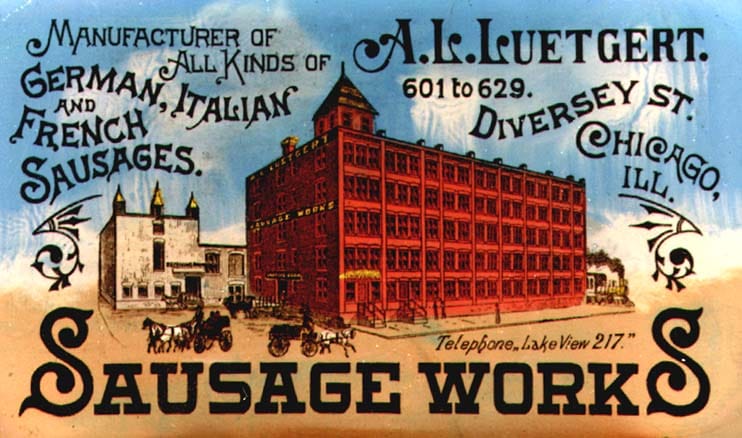
I live on the border of Lincoln Park and Lakeview on Chicago's North Side. It's a neighborhood on the upswing, with old warehouses and vacant lots filling with multi-million dollar town homes and condos.
My wife and I, along with two fairly strange cats live in a condo built in a historic building first constructed in 1892. These days, the "Sausage Murder Factory" as it's come to be known is the "cheap seats" of the neighborhood, as the surrounding property values dwarf ours.
Our building has been the subject of countless documentaries, ghost hunts, and legends. It's a grisly and interesting story, but I'd like to tell a different piece of the story, and that is how the building came to be.
Adolph Ludwig Luetgert is the less famous of two notorious "Adolphs," meat tenderizer aside. He deserves to spend the rest of history in infamy. But in 1845, he was just a holiday-season baby in Westphalia, one of 16 children. As such, he had to make his way in the world fairly early, and sought work in London. He did find work, scrubbing floors, but he couldn't see a path to growth or steady income, so he secured passage to the United States, the land of The New Colossus, as penned by Emma Lazarus and embodied by the Statue of Liberty.
I think it's worth examining the poem in its entirety here:
Not like the brazen giant of Greek fame,
With conquering limbs astride from land to land;
Here at our sea-washed, sunset gates shall stand
A mighty woman with a torch, whose flame
Is the imprisoned lightning, and her name
Mother of Exiles. From her beacon-hand
Glows world-wide welcome; her mild eyes command
The air-bridged harbor that twin cities frame.
"Keep, ancient lands, your storied pomp!" cries she
With silent lips. "Give me your tired, your poor,
Your huddled masses yearning to breathe free,
The wretched refuse of your teeming shore.
Send these, the homeless, tempest-tost to me,
I lift my lamp beside the golden door!"
At the end of the 19th century, THAT was the United States—A place where an ambitious 19-year old from an overcrowded country could find a hope of starting a new life with $30 in his pocket. I learned that in school and from Schoolhouse Rock. It's part of our mythos, and Luetgert made it real.
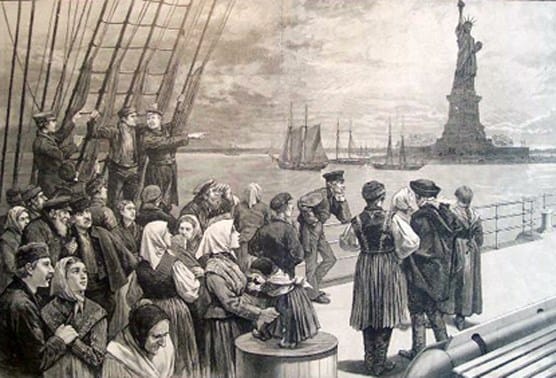
Our ambitious young immigrant sailed into New York, disembarked from that "air-bridged harbor," and lived the American Dream. After a brief stay in New York, he found himself in Quincy, Illinois where there were some family friends. But work was scarce so he headed North to Chicago, the city of Broad Shoulders. And a whole lot of livestock.
Luetgert's father had several sources of income, but much it came from tallow, wool and leather processing. After several odd jobs, Adolph began working at various tanneries in Chicago, and there were many. The pay wasn't great, but it was enough for him to save a bit, and in time, he had a wife, children, and $4,000 ($126,000 as of 2025) in the bank. It took about 10 years to go from a homeless 19-year old with $30 to someone with a family and a grubstake.
So he started a business.
First he dabbled in liquor, and then moved on to sausages, which combined his business sense with a product he knew well. His business grew, and when in 1890 he learned that the Columbian Exposition World's Fair was awarded to Chicago, he bid on a sausage franchise and won the contract.
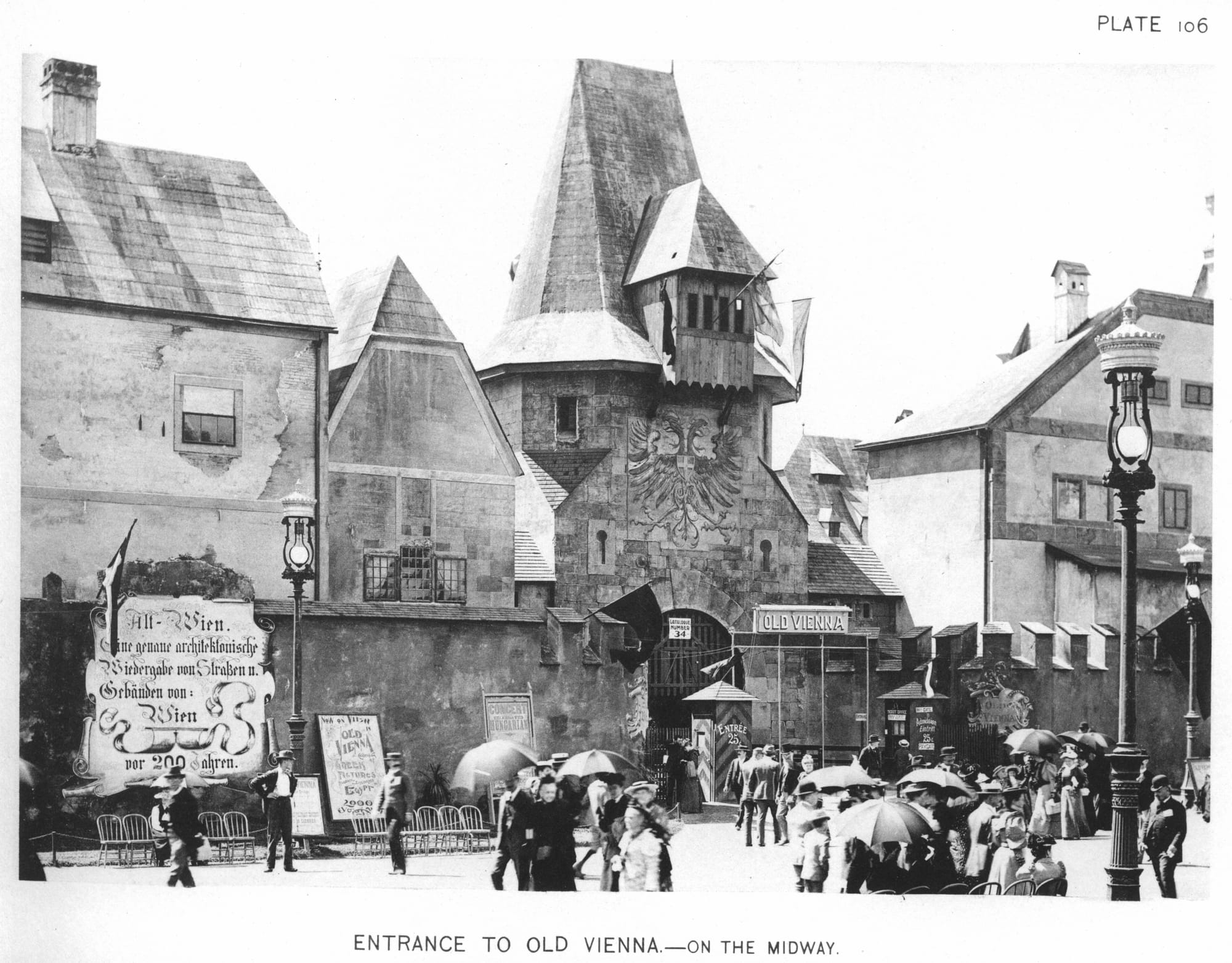
Against his wife's wishes, he spent most of his savings on the construction of an unusually large factory and warehouse for processing sausage. He made a huge name for himself and a lot of money at the Columbian Exposition, thus realizing the entirety of the American Dream by the age of 49.
If we end the story there, we have the perfect tale of how immigration, so-called "open borders" by those in power at the moment, made the America we live in today.
But the story didn't end there. The story took a horrible turn, and Luetgert is one of a great many American villains to lurk in the tunnels of history. His end involves domestic abuse, murder and a vat of corrosives. It also involves a new branch of forensic science, a new phenomenon in the "trial of the century," and a stream of ghost tour buses going by our building every summer. (One note: our storage cage is on the same spot as the infamous vat.)
Again, I'm not telling that story. I'm telling the story of an immigrant who came the to US and lived the American Dream. Who was also a "rapist and murderer" as we're being told most immigrants are.

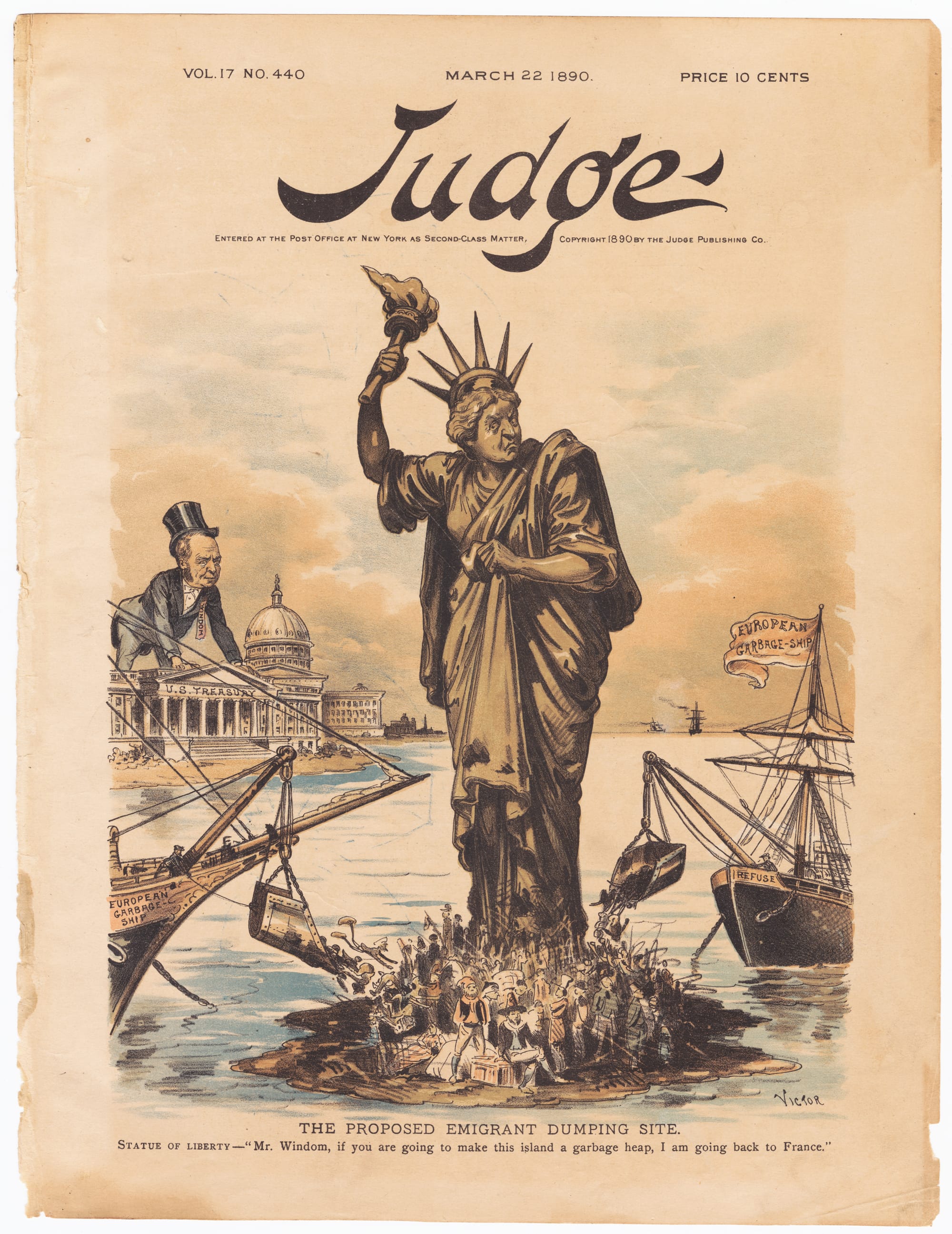
There was plenty of anti-immigrant sentiment during the turn of the 20th century, but it wasn't focused so much on race—it was focussed on religion. Yes, there was anti-semitism but there was also a very large anti-papist movement, as embodied by the impossibly popular newspaper The Menace, which at one time had a larger circulation than the New York Times and Chicago Tribune. It's truly vile stuff, but you've seen it before. Maybe last night. The people in power then were White Anglo-Saxon Protestants, who weren't quite keen on the message of the New Colossus.
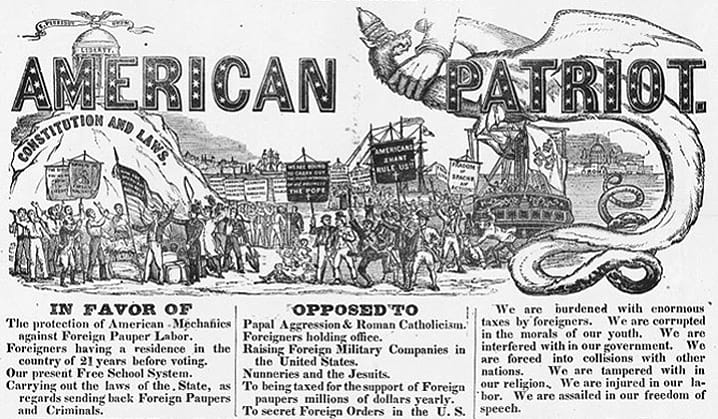
But over time, the immigrants "won," and they changed our country. As a nation, we became proud of our immigrant heritage, at least for some people and in some cases. Being of "German heritage" or saying "my grandparents were at Ellis Island!" can be expressions of pride, and no one will question it. My grandfather was an immigrant, a "Newfie," and no one bats an eye today.
From its first raising in 1886, our New Colossus has always been hollow.
Today, we have a new wave of immigrants who fall right into the promise of Emma's earnest poem, and again, we have The Menace in a new form. It's FoxNews. And they're in power, and setting the narrative. Luetgert's proven villainy does not cast aspersions on the 7,000,000 or so other German immigrants who helped form the 20th century. A descendant of German immigrants is president today. But if you're from south of the US border? You clearly aren't welcome.
Should a German or a Newfie or an Irishman or a Swede immigrate to the US today, they'll be welcomed. Despite their funny accent and inability to use a knife the "proper" way, they'll be seen as "us" very quickly. And that's for one simple reason: white people are in charge, and they want to keep it that way. A read through the daily news will provide enough evidence to rate that claim TRUE.
And that brings us to Texas, a state strongly influenced by German heritage. Shiner Bock didn't burst from the ground like crude, folks. Texas has always been a state of immigrants, particularly influenced by central Europe. By that score, you'd think they'd love immigrants, and they do!
But only if they're white.
This is not to cast aspersions on Texans. Texas is an incredibly diverse state that lives well beyond its stereotype. But its state government? Shameful.
And one extra mark of shame was placed upon that governmental head when they sent undocumented people, many if not most of whom were in the country legally, on a bus ride to Chicago and other major cities. Texas says it was voluntary, many of the riders say it wasn't, or that they didn't know what was happening. That aside, thousands of newly arrived "not white" people found themselves in major US cities with absolutely nothing.
I'm told they're rapist and murderers. And when I get home, I think of Luetgert who was both. Immigrants can do some terrible things.
The media likes to use examples of violence to prove Trump's proclamation. They'll discuss horrendous crimes in detail, but only those committed by folks in the country illegally. They ignore the vast majority that live in peace. Don't believe me? Maybe you'll believe the Cato Institute, an odd bedfellow if there ever was one.

But I also have to consider just how badly these folks want to be here. They know how hard is, they know there are dire risks—but they want to be an American for the same reason that Luetgert did: they want a chance to build a life, and they can't find that where they're from.
If you're someone who pays attention, you know that the "immigrant scare" was nonsense back in the early 20th century, and it's nonsense now. As a whole, immigrants commit less crime than US citizens, meaning that the more immigrants that come, the less per-capita crime there is. They're not sending "rapists and murderers." "They" aren't sending anyone. People are heeding the call of the New Colossus, and in my opinion, they deserve as much respect and welcome as your immigrant family has.
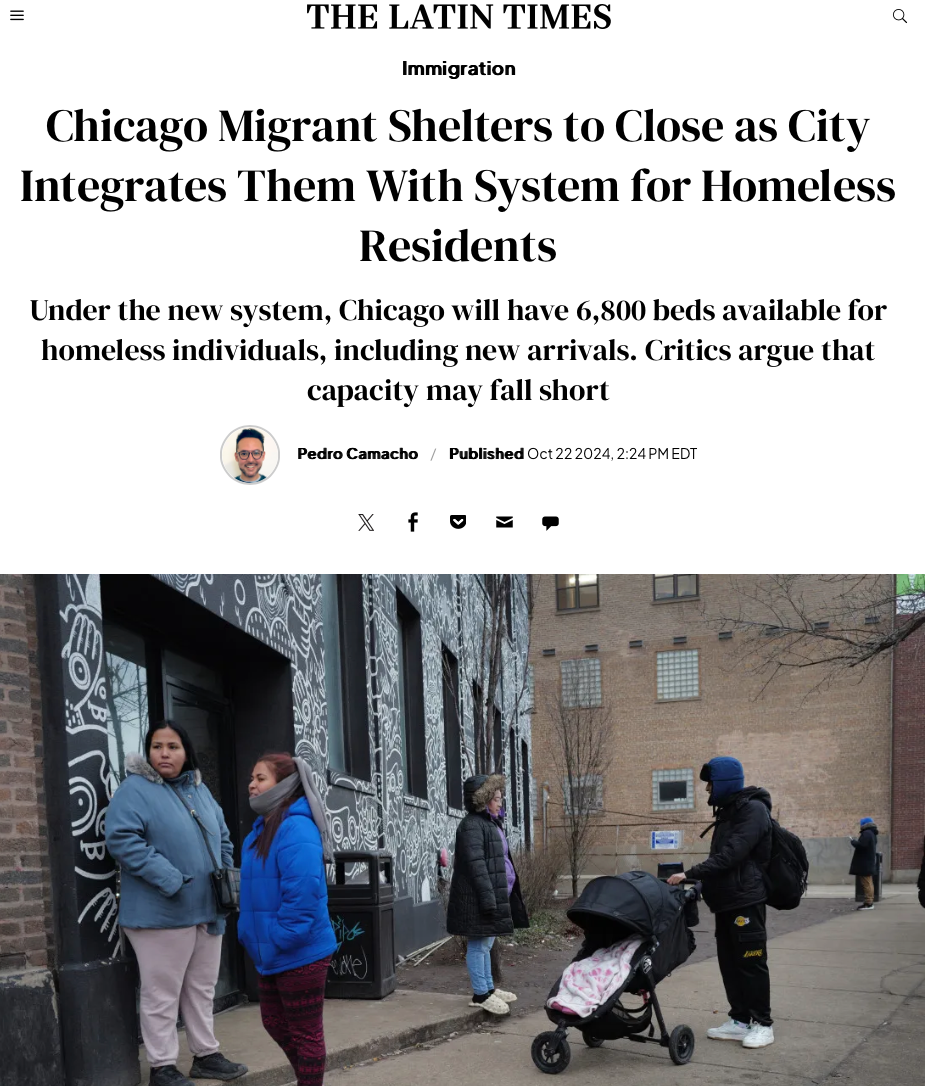
In our neighborhood, there are two Jewel-Osco grocery stores, five minutes walk apart from one another. Given that there are many neighborhoods in Chicago without any grocery stores at all, this has always seemed a luxury to me, and I take advantage of both of them depending on convenience.
Over the last couple of years, I've noticed more and more Hispanic families in the parking lot, often with signs written in English. While these folks are clearly motivated and hard workers—they never would have made it this far if they weren't—they're not allowed to earn any money at all in the US until they have documents. Even if they're in the country legally. Luetgert entered legally, so he could start working right away. These folks either came illegally (a misdemeanor) or they came through the asylum program legally. Both conditions prohibit employment.
Why didn't they just come here legally? THEY CAN'T.
Living in a big city, you see people asking for handouts all the time. Every major intersection, every walk down the street, someone is asking for your help often with a "God Bless" at the bottom of their cardboard sign. It is impossible to help them all, so for many Chicagoans, myself included, they become part of the ambience along with diesel fumes and litter. This is to our great shame, and a far bigger issue than I can tackle in this piece.
But the families in the parking lots—I know their story. I know what they went through, I know what they want. And sometimes I find myself able to break through the cynicism for a moment and offer them help. $20 here, some groceries there. They don't speak English and my Spanish, despite Duolingo's encouragement, is rudimentary at best. But we communicate, and fill a need.
My need is to fight injustice, even if only in a small, pebble-in-a-pond sort of way. And they need to feed their kids. One time, I gave a family a bit more money than usual and handed their daughter, who may have been six, a couple of Kinder-eggs. For a few moments, she was like any American kid, rapt in the mystery of what's beneath the chocolate.
It's not much, but it's not nothing.
When I see folks like this, I see people. Living, actual people, whose only difference from me is circumstance. I don't deserve the rich life that I have any more than they do. Maybe they deserve it more. But the rising tide in American culture is that they are lesser than I, somehow. And they're bad. And they must be sent away.
Why?
I haven't heard a single humanitarian response to that question.
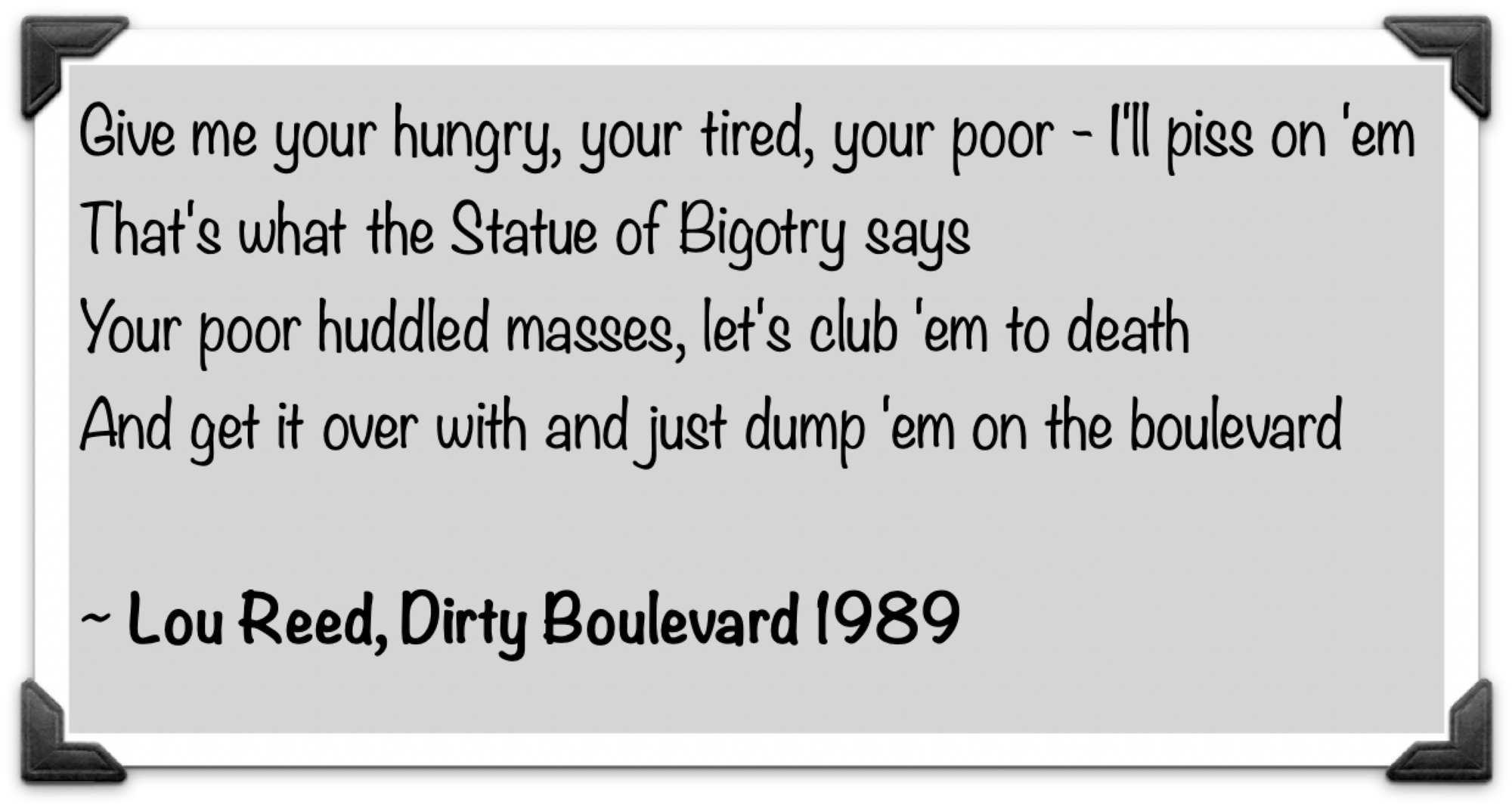
Since January 20th, I haven't seen them. Nor any of the thousands like them. Sure, it's cold in Chicago and maybe with the spring they'll return, the daughter a year older and maybe the father managed to get a work permit somehow or is one of countless undocumented workers keeping our restaurants going.
But as we see a repeating history creeping up on us, I can't help but think of a young girl in a Dutch attic, writing about her changing body in silence, lest the Germans find her and take her away. Is the Kinder-egg girl hiding now?
If so, what's the difference? And what should we do about it?
And why aren't we doing it?
A French politician has asked for "Lady Liberty" to be returned. At the very least, we should add an asterisk leading to a footnote that says "*Terms and conditions may apply."




